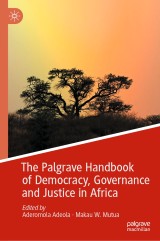Details

The Palgrave Handbook of Democracy, Governance and Justice in Africa
|
149,79 € |
|
| Verlag: | Palgrave Macmillan |
| Format: | |
| Veröffentl.: | 03.10.2022 |
| ISBN/EAN: | 9783030740146 |
| Sprache: | englisch |
Dieses eBook enthält ein Wasserzeichen.
Beschreibungen
<p>There is an emerging consensus that what is projected as democratic governance and justice in Africa requires a re-calibration, in particular, in relation to the constitutive demos, human rights, the realisation of commitments at various governance levels and the convergence between these ideations. The post-colonial narrative on democracy has unveiled some crevices in rule of law, political equality, political participation, political culture and freedom of the press. Aside from the fact that these notions are threatened by some existing institutional structures, these notions are increasingly being negotiated across political spaces. Evident in the prevalent narrative is an imperative for Africa to assert its place on the global scene of democratic governance and justice. However, if this will be accomplished, it is important to understand some of the issues that need to be worked through in this transition.</p>
<p>Africa in transition: issues in democratic governance and justice.- Election technology as a means of enhancing democratic legitimacy: a case of kenya.- Assessing cameroon’s elections against international standards and good practices on democracy and human rights.- State sovereignty and presidential term limits in africa.- Soldiers in civilian uniforms: the role of the military in the pursuit of third-termism.- Reflections on the role of the pan african parliament in advancing democratic governance in africa.- Beyond military counter-insurgency in nigeria: a 3d-approach as an alternative solution.- The economic community of west africa states and the mano river union: conflict, cooperation and accommodation.- The media and civil society as partners in transitional justice in côte d’ivoire.- Genocide, justice and democratic legitimacy: lessons from rwanda’s 25-year experiment.- The community court of justice of the ecowas and the advancement of human rights and social justice reformin west africa: three landmark cases.- Contemporary developments in human and peoples’ rights protection in africa: insights from the african union.- A regional policy framework on business and human rights in africa: process and prospects.- Righting the future from the past: four decades of human rights (illusions) in zimbabwe.- Constitutional courts as protection conduits: the role of egypt supreme constitutional court in advancing human rights protection.- The media and freedom of expression in democratic malawi: a formality or reality?.- The future in transition: realising respect for human rights in the ‘new’ gambia.</p><p></p>
<div><p><b>Aderomola Adeola</b> is a democracy and human rights expert and the lead editor of <i>Governance in Nigeria post-1999: revisiting the democratic ‘new dawn’ of the Fourth Republic</i> (2019) and <i>Compliance with International Human Rights Law in Africa</i> (2022). </p>
<p><b>Makau Mutua</b> is SUNY Distinguished Professor and Margaret W. Wong Professor at the University at Buffalo School of Law, USA, where he served as Dean for seven years, 2008-2014. He teaches international human rights, international business transactions and international law.</p>
</div><div><br></div><div><br></div>
<p><b>Makau Mutua</b> is SUNY Distinguished Professor and Margaret W. Wong Professor at the University at Buffalo School of Law, USA, where he served as Dean for seven years, 2008-2014. He teaches international human rights, international business transactions and international law.</p>
</div><div><br></div><div><br></div>
<div><p>There is an emerging consensus that what is projected as democratic governance and justice in Africa requires a re-calibration, in particular, in relation to the constitutive demos, human rights, the realisation of commitments at various governance levels and the convergence between these ideations. The post-colonial narrative on democracy has unveiled some crevices in rule of law, political equality, political participation, political culture and freedom of the press. Aside from the fact that these notions are threatened by some existing institutional structures, these notions are increasingly being negotiated across political spaces. Evident in the prevalent narrative is an imperative for Africa to assert its place on the global scene of democratic governance and justice. However, if this will be accomplished, it is important to understand some of the issues that need to be worked through in this transition.</p></div><div><p><b>Aderomola Adeola</b> is a democracy and human rights expert and the lead editor of <i>Governance in Nigeria post-1999: revisiting the democratic ‘new dawn’ of the Fourth Republic</i> (2019) and <i>Compliance with International Human Rights Law in Africa</i> (2022). </p>
<p><b>Makau Mutua</b> is SUNY Distinguished Professor and Margaret W. Wong Professor at the University at Buffalo School of Law, USA, where he served as Dean for seven years, 2008-2014. He teaches international human rights, international business transactions and international law. He is the author of several books including <i>Kenya’s Quest for Democracy: Taming Leviathan</i> (2008), <i>Human Rights NGOs in East Africa: Political and Normative Tensions</i> (2008) and <i>Human Rights: A Political and Cultural Critique</i> (2002).</p>
</div>
<p><b>Makau Mutua</b> is SUNY Distinguished Professor and Margaret W. Wong Professor at the University at Buffalo School of Law, USA, where he served as Dean for seven years, 2008-2014. He teaches international human rights, international business transactions and international law. He is the author of several books including <i>Kenya’s Quest for Democracy: Taming Leviathan</i> (2008), <i>Human Rights NGOs in East Africa: Political and Normative Tensions</i> (2008) and <i>Human Rights: A Political and Cultural Critique</i> (2002).</p>
</div>
Reflects some pertinent challenges, lessons, and experiences that are relevant to the process of transition Is an imperative for Africa to assert its place on the global scene of democratic governance and justice Acts as an emerging consensus that what is projected as democratic governance and justice in Africa


















